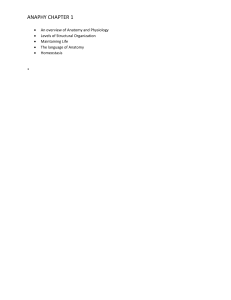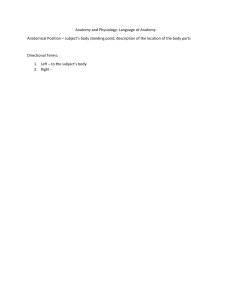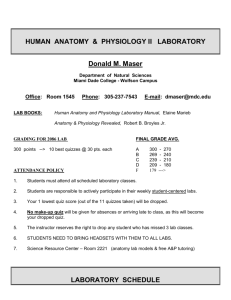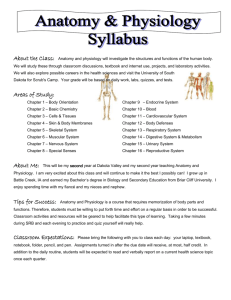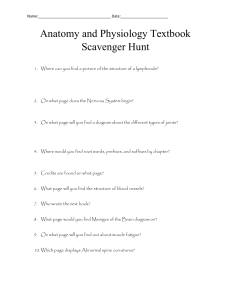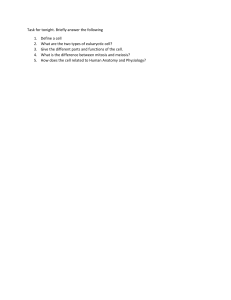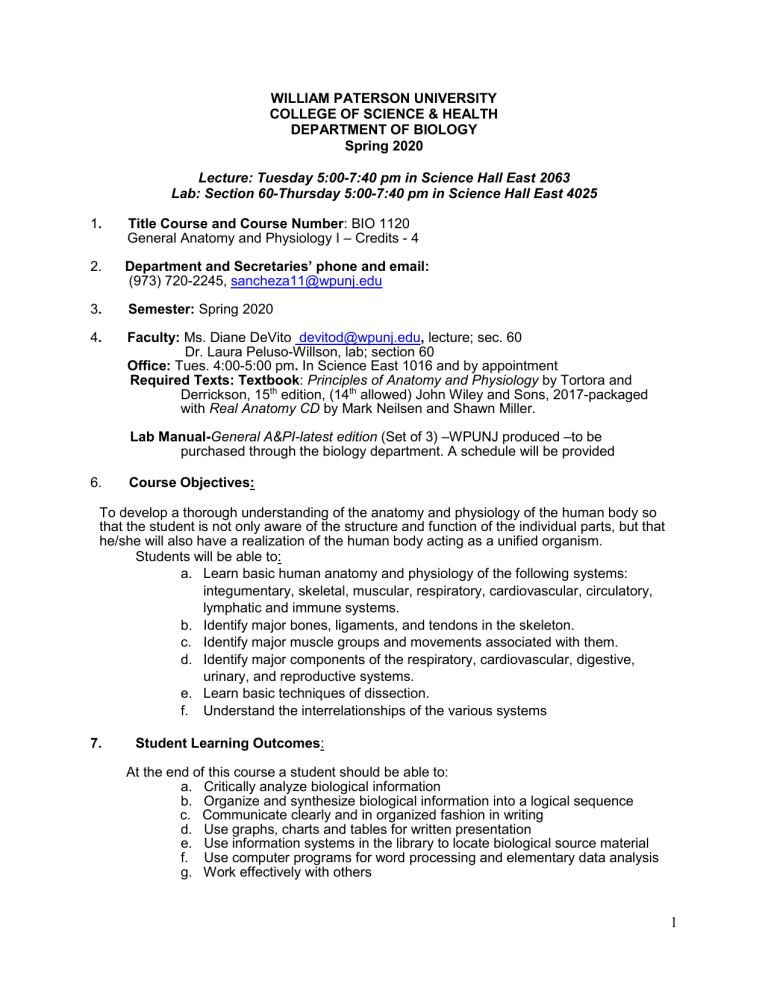
WILLIAM PATERSON UNIVERSITY COLLEGE OF SCIENCE & HEALTH DEPARTMENT OF BIOLOGY Spring 2020 Lecture: Tuesday 5:00-7:40 pm in Science Hall East 2063 Lab: Section 60-Thursday 5:00-7:40 pm in Science Hall East 4025 1. Title Course and Course Number: BIO 1120 General Anatomy and Physiology I – Credits - 4 2. Department and Secretaries’ phone and email: (973) 720-2245, sancheza11@wpunj.edu 3. Semester: Spring 2020 4. Faculty: Ms. Diane DeVito devitod@wpunj.edu, lecture; sec. 60 Dr. Laura Peluso-Willson, lab; section 60 Office: Tues. 4:00-5:00 pm. In Science East 1016 and by appointment Required Texts: Textbook: Principles of Anatomy and Physiology by Tortora and Derrickson, 15th edition, (14th allowed) John Wiley and Sons, 2017-packaged with Real Anatomy CD by Mark Neilsen and Shawn Miller. Lab Manual-General A&PI-latest edition (Set of 3) –WPUNJ produced –to be purchased through the biology department. A schedule will be provided 6. Course Objectives: To develop a thorough understanding of the anatomy and physiology of the human body so that the student is not only aware of the structure and function of the individual parts, but that he/she will also have a realization of the human body acting as a unified organism. Students will be able to: a. Learn basic human anatomy and physiology of the following systems: integumentary, skeletal, muscular, respiratory, cardiovascular, circulatory, lymphatic and immune systems. b. Identify major bones, ligaments, and tendons in the skeleton. c. Identify major muscle groups and movements associated with them. d. Identify major components of the respiratory, cardiovascular, digestive, urinary, and reproductive systems. e. Learn basic techniques of dissection. f. Understand the interrelationships of the various systems 7. Student Learning Outcomes: At the end of this course a student should be able to: a. Critically analyze biological information b. Organize and synthesize biological information into a logical sequence c. Communicate clearly and in organized fashion in writing d. Use graphs, charts and tables for written presentation e. Use information systems in the library to locate biological source material f. Use computer programs for word processing and elementary data analysis g. Work effectively with others 1 Spring 2020 – Gen. A&P I section 60. Tues. 5:00-7:40 PM-Science Hall East 2063 Schedule of Lecture Topics Week 1/28 2/04 2/11 2/18 2/25 3/03 3/10 3/24 3/31 4/07 4/14 4/21 4/28 5/03 5/12 Topic Introduction to A&P; Levels of Organization Chemical Level of Organization Cellular Level of Organization Tissue Level of Organization Exam 1; Integumentary System Skeletal System Joints, Muscular System Muscular System Exam 2; Respiratory System Cardiovascular System –Heart Cardiovascular System –Vessels, Hemodynamics Exam 3; Blood Components Lymphatic System and Immunity Catch Up and Review Final Exam –Cumulative Chapter 1, 2 2 3 4 5 6, 7, 8 9, 10 10, 11 23 20 21 19 22 All chapters This is a tentative schedule; there may be some changes depending on how we proceed. Lecture grades will be determined by three tests worth 100 points each and a cumulative final worth 150 points. The tests will be announced in advance. There will be extra credit opportunities on the tests. In addition, there will be 5, 20-point, do at home, quizzes for an additional 100 points. For the semester, there are 550 total points possible to earn. Final lecture grade will be based on number of points earned out of total possible. Chapters in the text should be read prior to the discussion in class. Learning objectives for each chapter will be provided ahead of time on blackboard. Writing out the answers to the learning objectives and handing them in on the day of the test will result in extra credit points. Tests and quizzes are based on the learning objectives. Review sessions for the tests will be held prior to the test, most likely during common hour. The lecture portion of the class will account for 75% of the grade while lab will account for 25% of the final grade. However, students must pass both portions in order to pass the class. Last day to withdraw from class without academic penalty is April 9. Students are expected to attend lecture regularly. You should arrive on time, ready to begin. Cell phones should be silenced and put away. Private conversations are a distraction to the lecturer and other students in class. Therefore, your attention should be on the speaker. No one should leave the room during class. There will be a break halfway through the lecture during which you can leave for the restrooms. If everyone follows these basic rules of courtesy, we will all benefit. 2 Spring 2020-LAB SCHEDULE General Anatomy and Physiology I – section 60 Section 60 –Thursday – 5:00 – 7:40 pm in Science Hall East 4025 Thurs. Schedule of Labs Lab Manual 1/23 1/30 2/06 2/13 * 2/27 3/05 3/12 3/26 4/02 4/09 4/16 4/23 4/30 5/07 Articulated Skeleton; Upper Limb Skull Lower Limb and Torso Joints, Movements, Skin, Osmosis Lab Practical 1 Muscles-Head, Neck, Abdomen, Back Arm, Leg, Gluteal Region, Thigh Muscles and demo. dissection Lab Practical 2 Respiratory System, Heart Heart, Blood Vessels Arteries, Veins, Digestive System Digestive, Urinary and Repro. Systems Lab Practical 3 Ex. 1-Part A Ex. 2-Part A Ex. 3-Part A Ex. 4-Part A Part A Ex. 1-Part B Ex. 2-Part B Ex. 3-Part B Part B Ex. 1-Part C29 Ex. 2-Part C Ex. 3-Part C Ex. 4-Part C Part C *Thursday, February 20, is a Monday schedule, no lab. The labs will run in the above order although there may be some flexibility. The lab grade will be based on weekly quizzes (worth 10 points), three 100-point lab practical tests and a review of your lab manuals. The lab grade is worth 25% of your final A&P grade. However, you must pass lab in order to pass the course. Attendance at lab is mandatory. Class will start on time. Quizzes are given at the start of class so coming late will result in missing a quiz. Please do not bring any food or drink into the lab –including water bottles. It is not permitted. Anyone needing additional help should use the tutoring center in the Science Enrichment Center in Science Hall East room 3023. The last day to academically withdraw from a course is April 9. 3
